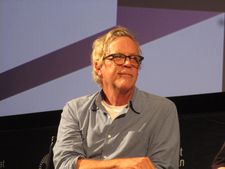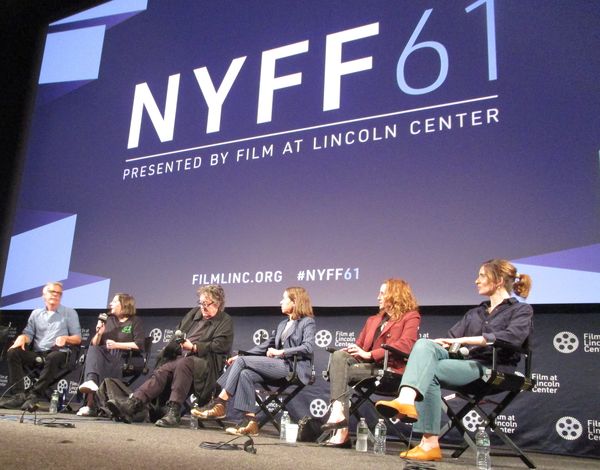 |
| May December director Todd Haynes with screenwriter Samy Burch, and his producers Christine Vachon, Pamela Koffler, Jessica Elbaum and Sophie Mas Photo: Anne-Katrin Titze |
Todd Haynes’s May December (Christine Vachon, his longtime producer was honoured at this year’s Karlovy Vary International Film Festival), screenplay by Samy Burch, shot by Christopher Blauvelt and starring Natalie Portman, Julianne Moore, and Charles Melton opened the 61st New York Film Festival on Friday. Todd’s previous films screening at the New York Film Festival were Velvet Goldmine (NYFF 36), I’m Not There (NYFF 45), Carol (NYFF 53), Wonderstruck (NYFF 55 - Centerpiece Selection), and The Velvet Underground (NYFF 59).
At the press conference Todd Haynes spoke about connecting his composer Marcelo Zarvos to Michel Legrand’s score for Joseph Losey’s The Go-Between (Harold Pinter’s adaptation of L.P. Hartley’s novel) for May December. He referenced two films by Ingmar Bergman, a scene in Persona with Liv Ullmann and Bibi Andersson and the one in Winter Light where Ingrid Thulin hands a letter to Gunnar Björnstrand; the Phyllis Nagy script (based on Patricia Highsmith’s novel The Price Of Salt) turning into Carol; Mildred Pierce and Jonathan Raymond’s adaptation of the James M Cain novel; Wonderstruck and Dark Waters scripts coming to him, and the historical importance of Douglas Sirk movies.
An unexpected blush applied to the cheeks, a smudge of fuchsia on the lips - new makeup can have a startling effect on the wearer. Cosmetics companies thrive (think the amazing Gucci Westman) because there’s a new face in the mirror and transformation seems possible. Todd Haynes furnishes his film with many mirrors that reflect the journey of an actress (Elizabeth, played by Natalie Portman) through the looking glass into the world of Gracie (Julianne Moore), a woman whose affair at age 37 with a seventh grader was tabloid fodder twenty years prior. Elizabeth arrives in Savannah, Georgia, in understated, carefully chosen minimalist outfits, including status jewellery, sunglasses, and straw tote, to do research for a movie about Gracie and her, now husband of many years. Joe (Charles Melton) is also the father of twins Mary (Elizabeth Yu) and Charlie (Gabriel Chung) who are about to graduate high school.
 |
| Todd Haynes with May December screenwriter Samy Burch Photo: Anne-Katrin Titze |
The balance held between creepiness and fascination, sheer fun and lingering disturbance is held throughout May December. As Elizabeth interviews people surrounding Gracie and watches her subject in close proximity, the more she begins to resemble her in looks and demeanour. The performances by Moore and Portman are spectacular in their opaqueness - acting is their business too, after all, and the reflection within the reflection makes it all the more mirthful. Gracie, who so wholeheartedly embraces a girlish femininity in pastel-coloured pants and and frocks, with long flowing honey hair and an overall cheery disposition in public, frequently dissolves into despair and tears in private moments. And in a third layer, something even more private emerges for us. A small speech impediment, a hint of a lisp, that comes and goes is the film’s Rosebud. It feels as though Moore developed an entire score for that lisp and the way Gracie phrases things at any given time.
The complex visuals pull us in. Moore doing Portman’s makeup - a moment snatched from Bergman’s Persona - is equally intimate and chilling. Gracie uses her own sponge to apply the blush and pushes back the bangs as they speak of their respective parents. Elizabeth comes from a family of academics and her mother wrote an important book. “My mother wrote a great recipe for blueberry cobbler” counters Gracie deadpan. They face the mirror and us, because we become the mirror. The music sets in. What is a woman? Who are we? What are the rules? Caterpillars and butterflies, going hunting with two Irish setters and sparing a fox. Hidden asthma, a possible childhood secret, a kid’s poem for an assignment, details keep piling on. The audition videos for her co-star to be are deemed “not sexy enough” by Elizabeth, as though this were The Most Beautiful Boy In The World.
 |
| Elizabeth Berry (Natalie Portman) with Gracie Atherton-Yoo (Julianne Moore) in May December |
My comment and question to Todd Haynes was the last one, closing the press conference moderated by Rachel Rosen:
Anne-Katrin Titze: I think you created the most fascinating lisp in film history. In this performance - how it comes and goes and moves from one to the other! Please tell me about the lisp!
Todd Haynes: I did not create the lisp! There are some people who are missing today who could speak so beautifully about how they built these characters. Of course Julianne in an extraordinary … We shot this movie in 23 days in Savannah with very limited resources. And that meant there was no rehearsal time. I mean, that schedule’s unusually short, but the fact that there is no rehearsal time is not unusual in films I’ve made.
But it meant that the burden on Julianne Moore to completely come up with the specificity of Gracie was enormous. Because we started shooting in the house scenes right away. And things like the wigs, which had to be made in advance, were decisions we had all been very much a part of. And planning and discussing and all that and the way Elizabeth’s hair would change a little in style to match the Gracie wig - they both were wigs.
 |
| Todd Haynes: “I read that monologue of Elizabeth towards the end of the movie and I immediately thought of the scene in Bergman’s Winter Light” |
Down to the cadence and her manner of speech - these were late, these were issues Julianne and I talked about it and yes, there were, to be honest, there were things in a kind of loose upper palate that we did find interesting in Mary Kay Letourneau’s speech. That was a kick-off for her. And she took it further. And also this idea of how does this kind of original relationship occur? What is the myth these two people tell each other about the roles they’re playing? She’s not a paedophile, this woman. She doesn’t have a history of going after every little teenage boy that walks by. There’s something very specific that happened to these two people, but it’s enshrouded in a fantasy.
Which is that she is the princess that needs to be rescued from the domestic tower. And he’s the young virile knight, you know, almost like a Greco-Roman young knight, you know, who’s going to come in with all this sexual virility and power and beauty and save her. And so she plays the little girl. It inspired aspects of the clothes and the manner of speech and the colour palette and all these things helped us to sort of understand how this happened or the delusions that helped produce it.
Earlier in the press conference Todd Haynes spoke about the different ways his projects come to be.
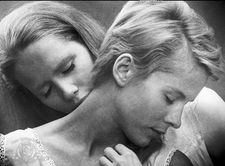 |
| Todd Haynes: “Of course Persona is another seminal urtext for the female merging/mirroring story.” |
TH: It actually started a while ago with the script of Carol, the whole project of Carol, based on Patricia Highsmith’s novel The Price of Salt, which had been kicking around for almost 20 years in development. That was a project that came to us through very close dear friends of ours who had inherited it as producers in the UK. Before that I had adapted - this was just my own decision with my writing partner Jon Raymond - Mildred Pierce from the James M. Cain novel. That was my first episodic to date small-screen project. So I’ve been moving in the direction of trying now different methods of how to find material.
Of course, even the films I have written and developed myself and researched often come from other sources and our ways of interpreting the histories around artists and musicians or works by filmmakers like Douglas Sirk. So I’ve always felt like I’ve been an interpreter of existing languages in film and in culture. Wonderstruck was a script that came to me and Dark Waters was a script that came to me and The Velvet Underground documentary I had done last was something that was suggested for me to do and it was again a completely new territory. For me an extraordinary thing to work and to play with. We were cutting that in the height of Covid when this script (by Samy Burch) came to me.
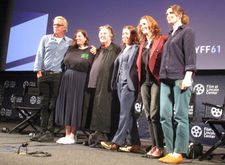 |
| Todd Haynes with Samy Burch, Christine Vachon, Pamela Koffler, Jessica Elbaum and Sophie Mas Photo: Anne-Katrin Titze |
A lot of scripts were circulating during Covid, because everybody was shut down and was speculating what to do next. This script was something else and left an impression on me that stayed with me.
The way the film got turned into a real production happened very quickly and with a lot of moving parts suddenly opening up and aligning brief moments of freedom for me and the two actors we jumped on last year.
Haynes continued:
For me the task was to try to find a visual and stylistic language in a series of tonal decisions that would give the viewer a comparable place to interrogate what they were watching. But I also felt it was really important - because I felt that on the page and I really loved that about it - that there’s an element of pleasure in doing so. It made you uncomfortable on every page, but there was an excitement about interrogating yourself as you read it. And I wanted that to be an experience for the viewer. There were a few decisions that helped me to start to set in place some tonal ideas. It had to do with the music, it had to do with the very restrained camera. It had to do with movies I immediately thought of, like films by Bergman, particularly Persona, but bringing too all of that a different kind of mischief, I think, in the way the audience might be able to navigate it.
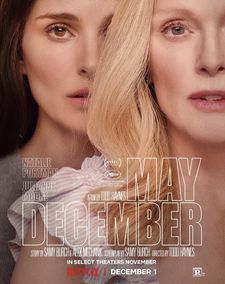 |
| May December poster |
I read that monologue of Elizabeth towards the end of the movie and I immediately thought of the scene in Bergman’s Winter Light, where Ingrid Thulin delivers a letter to the lens of the camera - the film is shot in black and white - in a medium shot against a neutral background. I remember seeing it when I was in high school and being completely riveted by the performance. It’s an unrequited love letter to a priest character in the movie. It was the simplicity and austerity of the shot that made such an impact. I thought - I have to do this movie, if only to shoot that monologue that way.
Of course there are all these scenes in mirrors and it’s about an actor studying a subject and learning how to become and interpolate that subject and internalize the subject in that strange process and that creepy process that goes on between the merging of the two women. Of course Persona is another seminal urtext for the female merging/mirroring story. And there are moments, even though they are not necessarily played as mirrors, where the two women ultimately do turn their gaze to the lens of the camera. And Bibi Andersson or Liv Ullmann, I can’t remember who because they’re already blurred by this point, brushes the hair slightly off the forehead of the other. These were ideas that also circulated in the film.
Around this time last year, the movie The Go-Between by Joseph Losey from 1971 played on Turner Classic Movies. It’s a film I remember having seen when I was a kid, but it had fallen out of circulation and I hadn’t seen it in so long. And the score in that film by Michel Legrand is an astonishment. It slaps you in the face! From the very first opening credits of the movie. And you are on alert in the most exciting way.
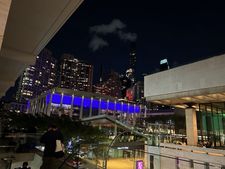 |
| Lincoln Center at night Photo: Anne-Katrin Titze |
It’s a pastoral coming-of-age story of a boy who goes to his rich brother’s family’s country house for the summer and develops an infatuation with his beautiful sister Julie Christie and so forth. In a way the score feels almost more outside the eventual plot of The Go-Between and even the sort of complicated moral background of this story. But I loved how it put the viewer in a state of active reading of the film in a sort of mysterious, ominous, investigatory state. Almost like the one Elizabeth undertakes as an actor. And so we worked with this music. We used it in preproduction of the movie, we used it while shooting the movie, we used it while cutting the movie.
Until finally I came to Marcelo Zarvos, my composer, and said “I think we got to try and use this music, man!” It is baked into the DNA of the film and the way the film seems to be working. Then he made it his own. Marcello arranged the entire score and wrote original music for it and we rerecorded it all from scratch. So I have the amazing Marcelo Zarvos score but I also was able to retain the powerful signature from Michel Legrand.
May December opens in the US on Friday, November 17 and will be available on Netflix Friday, December 1.
The New York Film Festival Main Slate selection committee, chaired by Dennis Lim, also includes Florence Almozini, Justin Chang, K. Austin Collins, and Rachel Rosen.
The 61st New York Film Festival runs through Sunday, October 15.








